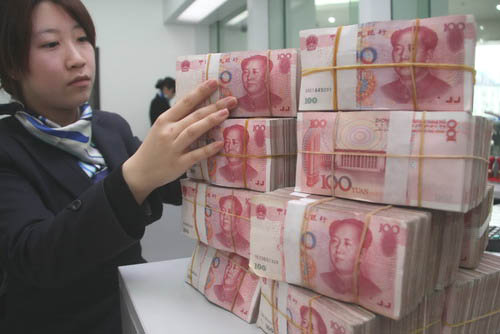|
 A bank clerk stacks up yuan notes in Nantong, Jiangsu province. The central bank pledged to ensure adequate liquidity to support economic growth by using various tools, such as reducing the reserve requirement ratio. [Photo/China Daily]
|
Central bank official says 'targeted' action likely in coming months
China's central bank has indicated that a further relaxation of monetary policy is on the horizon, such as more cuts in the reserve requirement ratio for commercial lenders to ensure adequate liquidity in the financial system.
"We will continue to implement prudent monetary policies, and fine-tune the measures when necessary to guide credit growth in a stable and appropriate way," Xinhua News Agency cited an official from the People's Bank of China as saying on Wednesday night.
In the coming months, the central bank will adjust banking liquidity, and take "targeted" action by considering foreign exchange inflows, capital demand, and short-term special factors, it reported.
"For instance, we could inject more liquidity through larger-scale repurchasing operations, a lower RRR, and matured central bank bills."
The official added that the central bank will provide timely liquidity support to financial companies facing a shortage of capital because they gave assistance to small enterprises and agriculture-related industries.
Zhang Zhiwei, chief China economist at Nomura Holdings Inc, was quoted by Bloomberg as saying that the central bank had "sent the market a signal that further loosening measures will be rolled out".
China's first-quarter GDP growth slowed to 8.1 percent year-on-year, falling below market expectations of 8.4 percent, and the central bank is likely to step up its policy easing over the remainder of the year. The next RRR cut could come as early as this month, said Liu Ligang, head of China economics at Australia and New Zealand Banking Group Ltd.
The central bank said banking system liquidity was "ample" by the end of March, as financial institutions' cash reserves totaled 1.8 trillion yuan ($290 billion), and the cash reserve ratio reached 2.2 percent.
And in the second quarter, nearly 800 billion yuan will be due and flow into the market, which means the liquidity supply will stay relatively high, it said.
Chinese banks made more new yuan loans than expected in March. New loans totaled 1.01 trillion yuan, exceeding market expectations of 800 billion yuan.
Throughout the first quarter, new yuan loans reached 2.46 trillion yuan, and the country's total financing stood at 3.88 trillion yuan, according to data released by the central bank.
Lu Zhengwei, chief economist at Industrial Bank Co Ltd, said the figures demonstrated that regulators and lenders are acting to avert a corporate cash crunch as the economy cools, but there may be fewer new loans in the second quarter.
Wang Tao, head of China economic research at UBS Securities Co Ltd, said if the government decides to further ease monetary policy, it may further loosen its reins on credit. It may, for example, try to shore up the economy by easing the credit limits placed on lending to local governments through financing vehicles.
"In other words, we believe that further policy easing may be reflected in increased bank loans. The RRR could be lowered in order to ensure that banks have sufficient liquidity to lend more. But that depends on the situation of new foreign exchange inflows."
She expected new yuan loans in the second quarter to reach 2.3 to 2.4 trillion yuan, and that the figure will stand at about 8 trillion yuan for the year.
The accommodative global monetary conditions will continue to put pressure on capital flows into emerging markets including China, and liquidity conditions are easing on the back of capital flows, said Cui Li, chief China economist at Royal Bank of Scotland Group PLC.
In March, the foreign reserve rose to $3.31 trillion from $3.2 trillion in December.
wangxiaotian@chinadaily.com.cn
